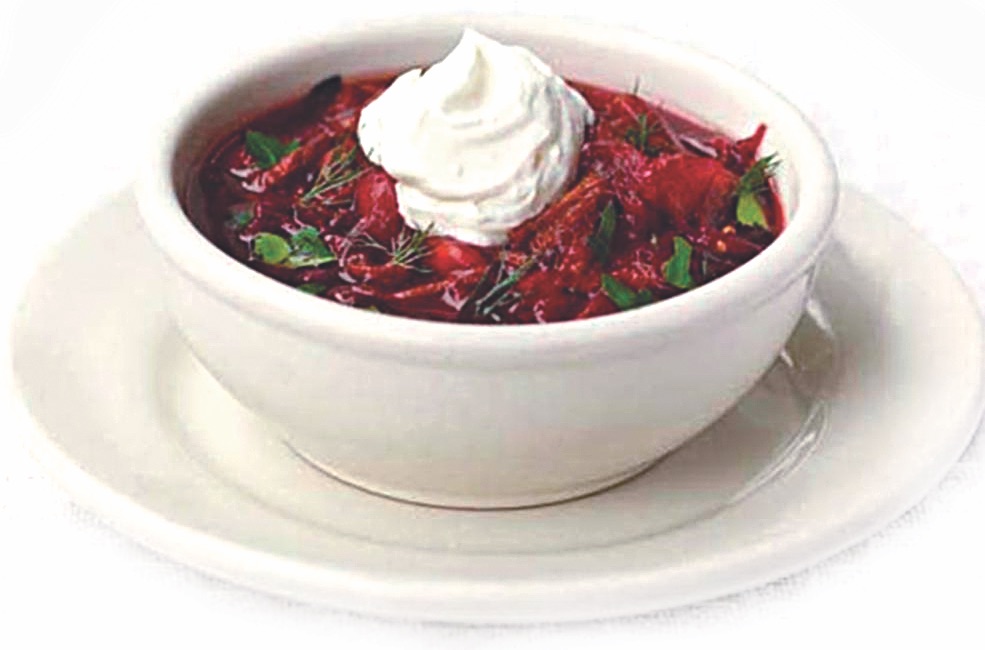
What do Sandra Bullock, Cate Blanchett and I have in common? We all spent a day at Veselka, an iconic Ukrainian restaurant in Manhattan’s Lower East Side. The actresses were filming a trailer for their upcoming girl-power caper, “Ocean’s 8,” and me, well, I spent a far more exciting day watching the borscht-making process in Veselka’s 63-year-old kitchen.
My guide for the day, Veselka’s Ukrainian-born executive chef Dima Martseniuk, a French Culinary Institute graduate and veteran of some of the city’s most competitive kitchens, showed me around the various stations that churn out absurd amounts of Eastern European classics like pierogi, cabbage rolls (sarma) and stroganoff, but I was here for another classic: Veselka’s world famous borscht, of which 5,000 gallons a year are made by one powerhouse Polish grandmother named Malgorsia.
The day I stepped into Veselka’s seemingly endless, underground kitchen happened to be the day that a cataclysmic blizzard dubbed the “bomb cyclone” befell the city starting at 5 a.m. Stabbing icicles of snow and wind made visibility grim when I reached the restaurant in the morning. But inside, sheltered by the warmth and coziness of Veselka, with the sweet smell of stock and savory meat all around me, I met a cyclone of a different variety and no less powerful.
Polish-born Malgorcata Sibilski, affectionately known as Malgorsia, has been making Veselka’s iconic staple, as well as all its other soups, for more than three decades. For five hours straight, I watched the diminutive 71-year-old grandmother of five lift, chop, paddle, schlep, taste, stir, hoist and smile. She didn’t talk much, so I just watched her until a bit past noon, when, in the middle of the lunch-rush chaos, she disappeared up the stairs for a few moments leaving me to contemplate my lack of energy in her wake.
Four minutes later, she reappeared with a plastic pitcher of coffee, two chipped Veselka mugs and a brown paper bag. She poured us coffees, adding cold milk from the walk-in fridge behind me and downed hers, her first of the day she told me, in a matter of seconds. She unfolded the paper bag, offered me a slice of bread from it and proceeded to shove half a slice into her mouth, tucking the other half into the pocket of her white chef’s coat, presumably for later.
There was no sitting, no resting, not even a moment to lose because there were 100 gallons of borscht to prepare for the weekend. All the while, workers trudged in and out of the kitchen, wearing coats, hats and scarves, remarking about what I assume were the weather conditions, speaking Polish, Russian, Ukranian and a language that one of the workers informed me is Malgorsia language, a mashup of Polish and English with a sprinkling of Ukrainian.
All the while, Malgorsia was stirring and talking, smiling, charming and stopping for a second to kiss a cheek here and there and greet workers who come or go during their shifts. She beckoned me to an enormous eight-burner stove, all burners bearing 25-gallon soup pots bubbling away with various fragrant liquid concoctions.
I followed her in an overwhelmed daze and watched as she explained in broken “Malgorsiaspeak” the various contents of the pots. One pot was full of cabbage and other vegetables that I watched her chop by hand the whole morning. Another, with huge white lima beans in a different broth, potatoes and onions in another swimming in meat stock. Yet another contained shredded beets with vinegar (for color I was told), and a final pot containing a strong version of beet juice that was squeezed the previous Sunday and was reducing. The meat has been cooked and is in the cold room waiting to be chopped because it is “easier to slice when it’s cold.”
She stood on tiptoes and used an oar about the size a person would use to paddle a canoe, but with a shorter handle. Martseniuk, the head chef, tried to help her reach the pots on the back burners but failed to get the stirring technique exactly right. He told me that he can’t quite use the oar the way she does although he is bigger and stronger; only she can paddle the soup with the oar in the right way.
I asked him what would have happened if the weather had prevented Malgorsia from coming to work that day, seeing as she lives 35 miles away in New Jersey and the cyclone bomb had some people sheltering in place that day. Martseniuk laughed and said, “No chance of that. War, no war, rain, snow, cyclone bomb, nothing would keep Malgorsia from work. Nothing!”
“What would we do without her to make
the borscht?” — Tom Birchard
Later, Veselka’s owner, Tom Birchard, told me that Veselka employs a high percentage of older workers and is being given an award later in the month by Columbia University for being a leader in the industry in this regard. “Older workers are mature and have an incredible work ethic, as you can see. What would we do without her to make the borscht? Can you believe her passion and dedication?” he asked me. I admitted to him that Malgorsia has astounded me with her speed, efficiency and passion for her “art,” as she called it.
“This is my play,” she said when we finally were ready to put together the borscht eight hours later, six pots and pans of cooked ingredients in front of us along with her trusted paddle, to be mixed into a huge cauldron and then separated into 50, one-gallon empty plastic Hellman’s mayonnaise containers.
For five minutes, she mixed and seasoned until finally she stuck one of her gloved pinkies into the soup for a taste. I looked at her expectantly. Silently, she handed me a spoon the size of my head and nodded toward the pot. “Try,” she said.
I got the feeling it was a test to see what I’m made of, and sure enough, to me, the soup needed salt and acid, so I told her so. A smile broke across her face, an indication that I didn’t fail her. “Bravo! Yes, we add,” she said as she mixed in some more vinegary beet juice and Maggi. “Now we play until we are happy.”
Upstairs in the restaurant, after the woman The New Yorker dubbed the “Queen of Borscht” had played with her soup enough to be happy, I was served a steaming bowl of “Veselka Red” (a real term in New York) beet soup with chunks of potatoes, lima beans and tender meat. On the side were two perfect slices of the house-baked challah and a dollop of sour cream that seems to have come from some heavenly planet.
I contemplated the snowy wonderland outside the steamy windows, and the huge “Veselka is Love” sign made out of foot-tall red, wooden letters hanging above my head. I was surrounded by young and old people speaking many languages, some laughing and some just sitting in quiet meditation in this little piece of old New York on Second Avenue. I raised a spoon to my mouth and remembered a sentence from the Talmud: “A person will be called to account on Judgment day for every permissible thing he might have enjoyed but did not.”
Rest assured, at Veselka, full enjoyment regularly ensues — and with great abandon.
Stay tuned next week for Veselka’s borscht recipe.
Yamit Behar Wood, an Israeli-American food and travel writer, is the executive chef at the U.S. Embassy in Kampala, Uganda, and founder of the New York Kitchen Catering Co.























 More news and opinions than at a Shabbat dinner, right in your inbox.
More news and opinions than at a Shabbat dinner, right in your inbox.